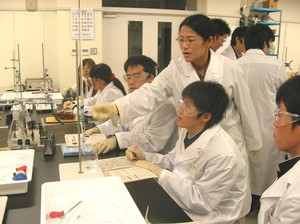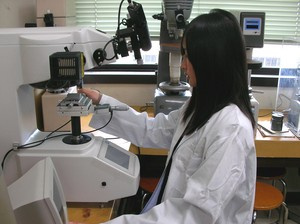Department of Environmental Materials Engineering

Basic Experiments for Environmental Materials Engineering

Micro Vickers Hardness Meter
Overview
Industrial technology cannot grow without the development of superior environmentally-friendly materials. Materials engineering is the foundation supporting advanced technologies, and at the same time, serves a very important role in providing solutions to resource and global environmental issues. In the future as well, the development of materials will continue to be in demand from new perspectives which take into account environmental conservation and recycling-oriented societies in a variety of industrial sectors. The Department of Environmental Materials Engineering aims to produce material engineers capable of manufacturing materials compatible with environmental conservation and advanced technological societies.
Educational Aims
We aim to produce engineers who will learn the importance of a recycling-oriented society and acquire the basic specialized knowledge and skills for materials engineering so that they are able to manufacture materials compatible with environmental conservation.
Features of the Curriculum
In the initial years of the curriculum, students acquire basic knowledge of physics, chemistry and other fields having a strong relationship with materials. In their later years, students study knowledge and skills related to metals, ceramics and high polymer materials. With the aim of becoming materials engineers capable of manufacturing environmentally-friendly products who maintain a proactive stance and ingenuity, our curriculum allots many hours to experiments and practical training. Through this, they study a broad range of subjects ranging from the environment and energy to material mechanics, functional elements and other fields related to machinery and electronics.

